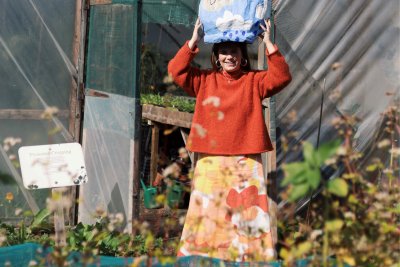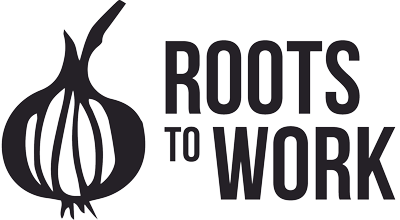
What do you do in the sustainable food sector?
I am a grower and a print designer, but more broadly, an all round vegetable fanatic. People often ask what the link is between the two but to me, it’s a clear connection. I tell stories through my drawings - extracting colour palettes directly from nature as well as using found forms and textures. I also play a part in the soil story too, giving a voice to the silent yet essential part of our existence beneath our feet, learning how to nurture and narrate its needs. I am currently in the process of moving out of London to start a Seasonal Growing position at Abbey Home Farm that I actually found on Roots to Work.
What was your route into this sector?
Working initially as a spare pair of hands to make some money, I worked in a family run greengrocers in my university town during lockdown, fulfilling veg boxes. I felt like I was curating these texturally rich and colourful veg boxes with more care and contentment than the degree I was trying to finish. The majority of the produce was grown on the local farm that the family owned and I quickly became involved in the journey from soil to shelf. My knowledge and enthusiasm surrounding seasonal growing grew and on Moving to London to study my Masters in Illustration I once again turned to the land. I spent a year documenting the importance of a community growing space in Hackney, London. Through research, conversation and days spent round raised beds I spent a lot of time working with Growing Communities, a community led organisation who sustainably source organic fruit and veg at prices fair to the farmer and for the consumer.
Alongside this, I was still making prints for fashion companies all round the world, seeing my designs on the high street and on strangers during my morning commutes but nothing quite met the satisfaction of scrubbing soil out from under your nails. I also couldn’t sustain a living from the freelance lifestyle so I would spend my evenings frantically looking for ways into the horticultural industry. Which is where I found the Future Gardeners training programme and well, here I am!
What’s the best thing about the work that you do?
With growing, especially small scale organic growing, all parts of the process are completely transparent. You use seeds from trusted, certified sources or you use saved seeds from the year before, then you work with the land in front of you and grow an abundance of (hopefully) nutrient-rich produce which is then harvested and then consumed in a whole host of ways, keeping you alive and well. Every step has a purpose and can be tracked down to an individual who has made it happen.
What challenges or obstacles have you faced in your career and how have you overcome them?
Confidence. I am susceptible to imposter syndrome and not feeling good enough. It makes me tense up to think of how many opportunities may have presented themselves had I just spoken up and sung my own praises a little bit more. It’s taken me a while to get to grips with my career change into a greener line of work and my mix of experience has felt at times like a hinderance.
Having a core understanding of the growing process is beneficial but having passion and enthusiasm is something that doesn’t require relevant experience and has the ability to put you on the road to wisdom in one way or another. Future Gardeners helped me pull this personal conundrum apart and burst these inner myths about inexperience, equipping me with core skills but also placing me in professional growing settings and allowing me to gain more confidence as part of a group of keen passionate horticulturalists with a whole host of potential - it was inspiring!
Who or what inspires your work in this movement?
For me, it’s those who have made growing accessible that really inspire me. Casting my mind back to the greengrocer days when customers would come in to tell me how they’d never tasted salad as fresh before or be it chefs who demonstrate farm to fork with ease and clarity, organisations who are able to feed local communities organic affordable produce while maintaining a fair price for farmers and individuals who pioneer the green spaces local to them - the list goes on! All of these people contribute to creating spaces of opportunity and sanctuary to all members of the communities while maintaining and championing the spaces that already inhabit so much life and diversity.
What are your hopes for the future?
The future is scary, there is no denying that. This being said, it’s hard not to find the fragility of our ecosystems overwhelming, so on a personal level, I’d like to contribute towards a more positive, sustainable future in any way I can. I am not short of hopes and dreams for the future and one day I hope I can continue to merge my communicative design experience with my practical growing skill set to shed more light on the importance of sustainable food and its benefits to us as a community and physically as an individual. Whether that be growing in a market garden or growing visions with organisations to enable good food for all - as long as I’m contributing to something worthwhile.
What advice would you give to anyone that is passionate about sustainable food systems and wants to work in this sector?
Do it. If not now, when? We need that passion more than ever. It’s also not as hard as you think. This sector is so multifaceted and presents so many opportunities for people with different backgrounds, you just have to dig a little deeper.
You can follow Millie on Instagram @millie.sandy. Find out more about upcoming free and accessible Future Gardener courses.



